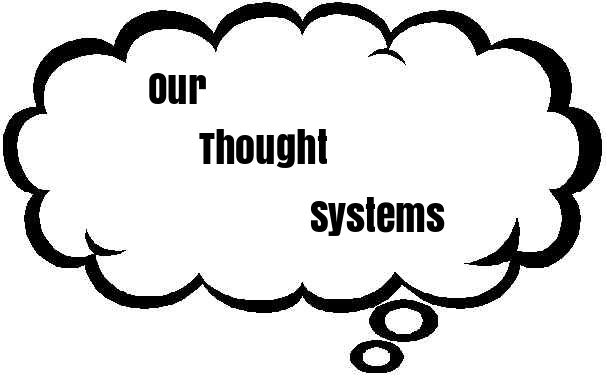All of our thoughts from the past come together to build our thought system. This thought system becomes our reality, our lens through which we see the world. It is the filter upon which we make decisions, form reactions, and interpret what we experience and give it significance. It forms our beliefs, expectations and opinions.
Our thought system can be stubborn and self-validating. As Richard Carlson states in his book, You Can Be Happy No Matter What, "Our thought systems lead us to believe that we are realists and that the way we see life is the way life really is. The fact that one person can view a situation as an opportunity and another equally intelligent person sees the same thing as a major problem doesn't bother a thought system. Our thought system dismisses the other point of view as off track, well intended but wrong, or not quite right."
Our thought systems prompt us to continue to see things in the same way as we have in the past. We react negatively or positively to similar situations or circumstances over and over again, interpreting things the same as we have in the past. We tend to accept familiar ideas and disregard the rest.
Carlson gives this example, "A person who believes that people are inherently critical will become defensive whenever anyone offers a suggestion, regardless of whether the person meant to be critical. This will become a theme in his life unless and until he understands the nature of thought systems, particularly his own. Understanding this concept will help him see that he is not seeing reality, or truth, but an interpretation of reality through his own thinking."
Understanding thought systems allows us to let go of the need to be right. It allows us to recognize that our beliefs, our thoughts, and our opinions are a function of past conditioning and experiences. If our past was different, our ideas and beliefs on life would also be different. Before this understanding we tend to discount information that we don't agree with. New information is usually unwelcome in our existing thought system. Once we understand thought systems, it's easier and less frustrating to hear, and be curious about, other points of view.
Awareness is a huge first step. Once we are aware of our thought system and the concept that thinking is an ability which precedes feelings, we can begin managing our thoughts, our feelings and our thought systems. We can open ourselves up to other possibilities, interpretations, opinions and beliefs without becoming frustrated or wounded. This opens the door to a healthy mental state and to sustained happiness.
What do you think about the concept of our thought system? Does this idea make sense to you? Can you see how it would be easy for us to repeat the same thought patterns over and over again? I would love to hear your feedback on this post. Drop me a comment or send me an email.
As I was writing this post I received an email with a link to a video by Gabrielle Bernstein titled, How to be More Mindful Everyday. Gabby does a great job of discussing in this video how in each moment we can choose to be mindful and happy. I invite you to check out her awesome 12 minute video at:
gabbybernstein.com/how-to-be-more-mindful-every-day/?inf_contact_key=6637541c19ec8a36d3c2d01fbbba05c54c93c1de87674cb66d09686980f8f363

 RSS Feed
RSS Feed
